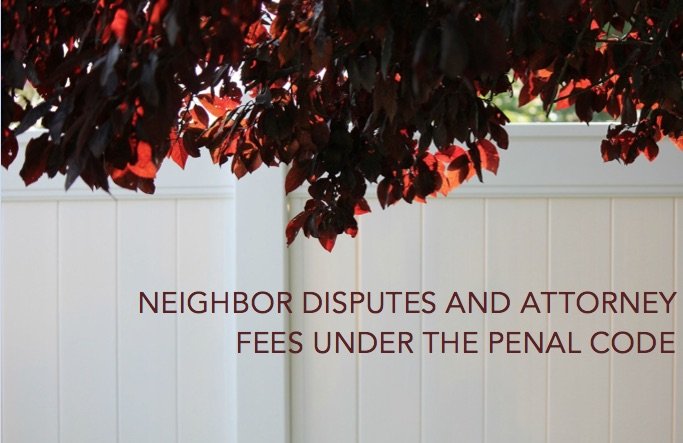

Updated on January 4, 2023
Neighbor disputes involving real property are never fun. To sustain your neighborly relationship with those who live next door, it is always best to amicably resolve these disputes. Common neighbor disputes include loud noise, blocking the driveway, tree roots or overhanging trees, and, of course, the litigious boundary line dispute.
Unfortunately, however, on many occasions these disputes cannot reasonably be resolved. Moreover, in the process of attempting to resolve them, discussions between neighbors become acrimonious and relationships crumble. For this reason, whenever you encounter these types of disputes, it is sometimes worth the extra money to hire a boundary dispute attorney in Los Angeles . Yes, attorney’s fees are often unrecoverable in cases involving neighbor disputes over real property. Nonetheless, these fees could be recoverable under the penal code.
In California, Code of Civil Procedure Section 1033.5(a)(10)(A)-(C) provides that attorney’s fees are recoverable as costs only when authorized by contract, statute, or law. For the most part neighbor disputes fall outside this section’s purview since there is often no contract, statute, or law specifying that the prevailing party is entitled to attorney’s fees.
This is where the penal code may be of help. In relevant part, Section 496(a) of the Penal Code states:
Every person who buys or receives any property that has been stolen or that has been obtained in any manner constituting theft or extortion, knowing the property to be so stolen or obtained, or who conceals, sells, withholds, or aids in concealing, selling, or withholding any property from the owner, knowing the property to be so stolen or obtained, shall be punished . . .
Thereafter, Penal Code section 496(c) states: “Any person who has been injured by a violation of subdivision (a) . . . may bring an action for three times the amount of actual damages, if any, sustained by the plaintiff, costs of suit, and reasonable attorney’s fees.”
Thus, the question is, when would this section apply? Arguably, it would apply to a dispute wherein your neighbor removes a fence that you erected on the property line. Or it could also apply in a situation where your neighbor engages in self-help by removing a tree from your yard because the branches cross the property line. Both of these circumstances would arguably fall under the laws against theft/larceny.
Admittedly, at first glance, pursuant to Penal Code Section 496(a) “receiving property” may strike you as being distinct from theft. However, California courts have held that anything that could be the subject of a theft can also be “property” under the statute prohibiting the receipt of stolen property. (See Bell v. Feibush (2013) 212 Cal. App. 4th 1041, 1049 (A principal in the actual theft of the property may be convicted for either theft or receiving stolen property under section 496(a)).)
Thus, it is arguable that Penal Code Section 496(c) is implicated in certain neighbor disputes, which, pursuant to C.C.P.§1033.5(a)(10)’s (B) or (C), would entitle the prevailing party to attorney’s fees.
To summarize, it is always best to resolve neighbor disputes without litigation. If, however, litigation is inevitable, then you should consider whether Penal Code Section 496 applies to your case.
If you need a real estate lawyer in Los Angeles, Santa Ana, the San Bernardino, San Diego County Orange county or anywhere else in California, to help you with a neighbor dispute involving real property, contact Schorr Law.
Are you looking for a property easement attorney in Los Angeles? Schorr Law is a Los Angeles based real estate attorneys professional corporation. Call 310-954-1877 to schedule a consult. Ask us if you qualify for a free consultation.